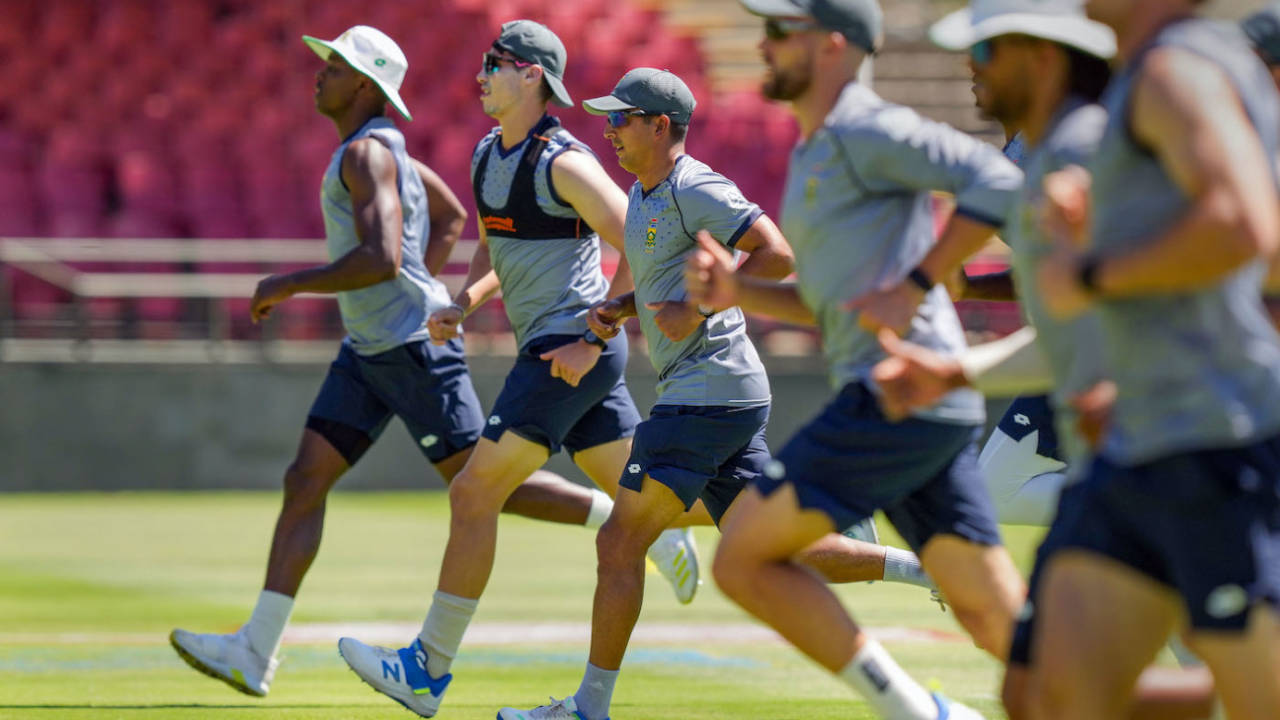T20 World Cup squad: CSA criticised for failing to meet transformation targets
The provisional squad for the World Cup includes six players of colour, of which just one - Kagiso Rabada - is black African
Firdose Moonda
14-May-2024
Kagiso Rabada is the only black African player in South Africa's T20 World Cup squad • PTI
South Africa's T20 World Cup squad has "failed to meet the [transformation] targets set by CSA", resulting in the board's admission that "various initiatives that have been pursued over the years have not yielded the desired results, especially in terms of producing Black African cricketers at the highest levels".
But this will not, according to a board spokesperson, extend to interference in selection.
The 15-player provisional squad includes six players of colour, of which just one - Kagiso Rabada - is black African. CSA's current target requires the national squad to field - on average over the course of a season - six players of colour in an XI, of which at least two must be black African. They will have the opportunity to improve on the average over the 2024-25 summer but even if Reeza Hendricks, Bjorn Fortuin, Keshav Maharaj, Tabraiz Shamsi, Rabada and Ottniel Baartman play every game, South Africa will still miss the target of two black African players at the T20 World Cup, which has caused concern in some quarters.
Speaking on the national broadcaster, SABC, former CSA and ICC president Ray Mali criticised cricket for going "backwards" and "betraying the people who asked us to negotiate unity", while former sports minister Fikile Mbalula, the secretary general of the ruling African National Congress, called it a "reversal of the gains of transformation".
Mali was particularly severe in his assessment of how the squad is selected and said the "system of giving a team for one person to select is not going to work in a country like ours", while advocating for the return of a selection panel.
South Africa no longer have a committee of selectors, with the decision-making power in the hands of the head coaches: Shukri Conrad (in Tests) and Rob Walter (white-ball cricket). Both coaches make the final decision in consultation with the director of cricket, Enoch Nkwe. Despite that, South Africa has missed their targets recently, particularly as not enough top black African players have been available.
Walter was questioned over the squad composition when it was announced last month and at the time said his "number one imperative is to create a winning team".
He blamed the domestic system for not providing enough depth to pick a more diverse squad. "The system needs to really up the ante so that in six months, 12 months, or two years' time, and in particular when we reach the 2027 [ODI] World Cup at home, that the demographics and the representation in our team starts to look a bit different."
The CSA board has not insisted on Lungi Ngidi's selection in the final 15-player squad (he is a travelling reserve), and will not influence Rob Walter's choice on final XI, unlike what it has done in the past
CSA has, in essence, agreed with Walter by admitting that there is a lack of black African talent at the highest level and has committed to an acceleration programme for unearthing and developing players. Nkwe "presented to the Board plans for the acceleration of Black African batting talent and a plan to ensure a more representative group of players ahead of the 2027 ODI World Cup on home soil," a board representative said. "The Board endorsed these plans."
South Africa have no black African batters in the T20 World Cup squad and realistically only had one other black African player who could have been included: Lungi Ngidi. He will travel as a reserve player, with Anrich Nortje preferred because, according to Walter, he offers "raw pace". Nortje returned from a nine-month absence at the IPL after sustaining a lower back stress fracture, and has taken seven wickets in six games while conceding 13.36 runs per over. Ngidi missed the IPL because of a hamstring injury but played for Titans in the CSA T20 Challenge, where he took eight wickets in eight matches and gave away 8.30 runs an over.
The CSA board has not insisted on Ngidi's selection in the final 15-player squad, and will not influence Walter's choice on final XI, unlike what it has done in the past. Most notably, at the 2015 World Cup, then CSA CEO Haroon Lorgat reminded then coach Russell Domingo to choose the semi-final XI with transformation targets in mind. At the time, CSA did not have a black African quota in place but required XIs to field at least four players of colour. South Africa had started the tournament with five players of colour in the XI but that dipped to three as the tournament went on. For the semi-final, Vernon Philander was selected for the match against New Zealand ahead of Kyle Abbott.
Firdose Moonda is ESPNcricinfo's correspondent for South Africa and women's cricket

